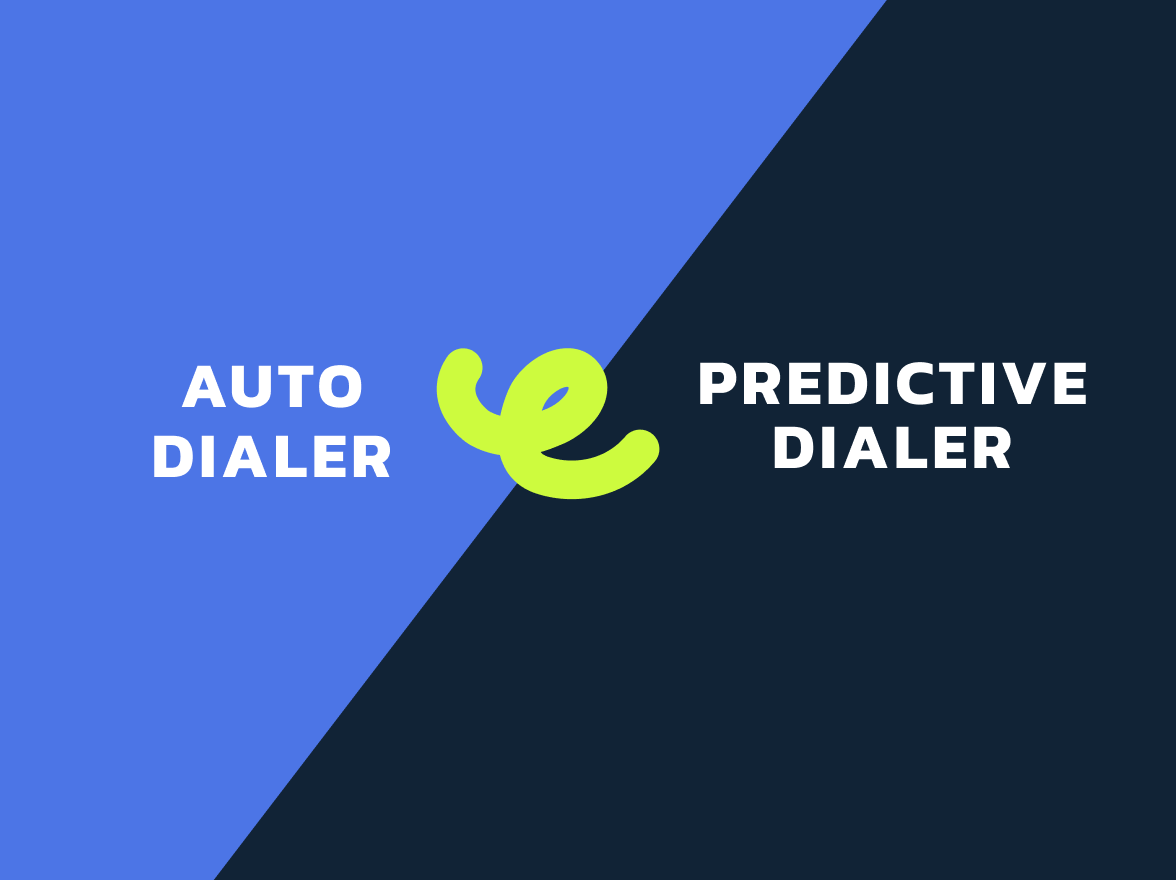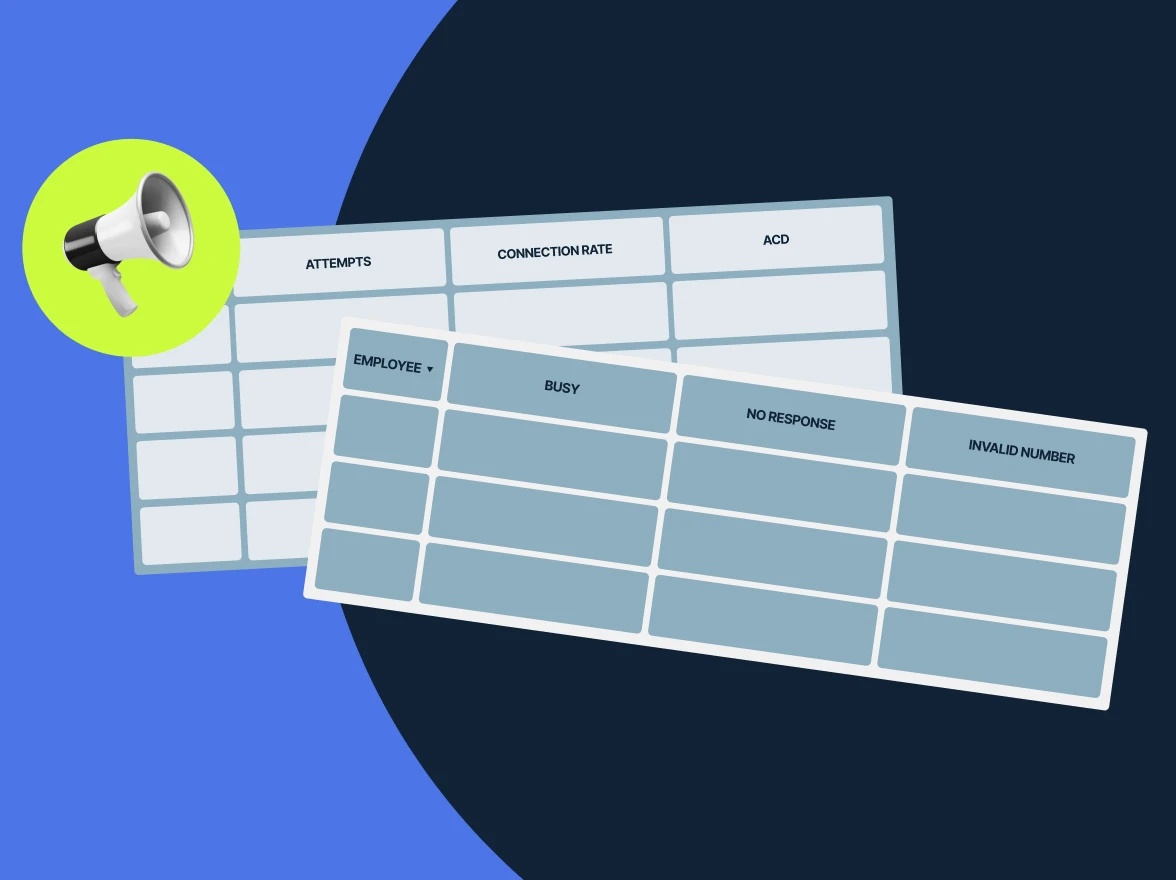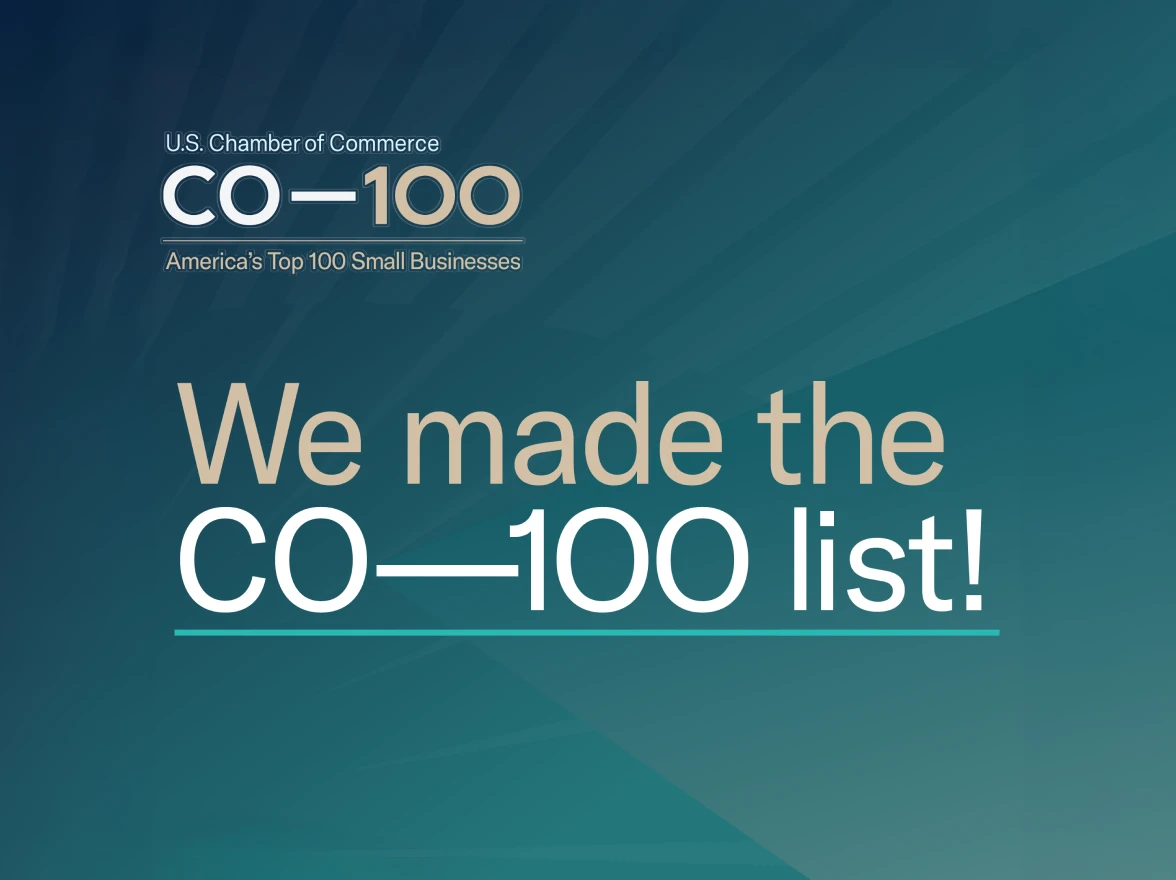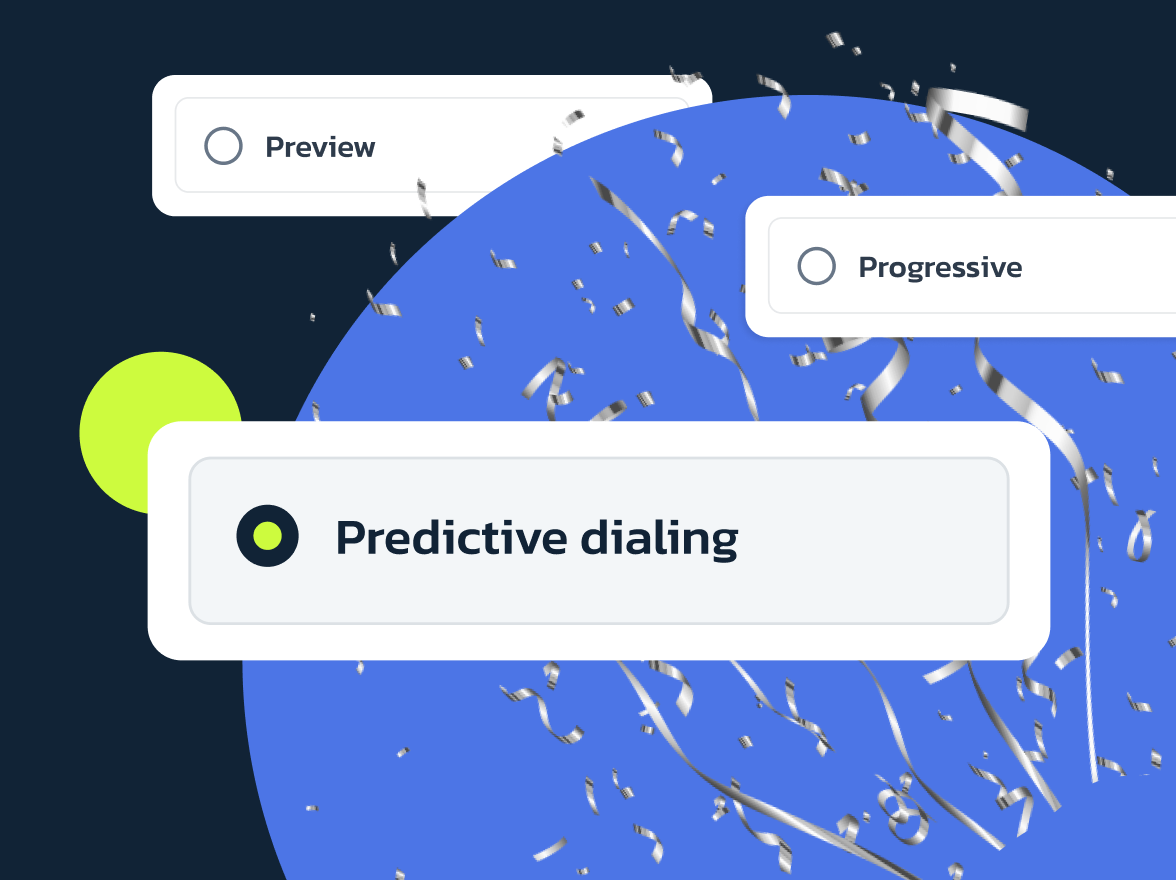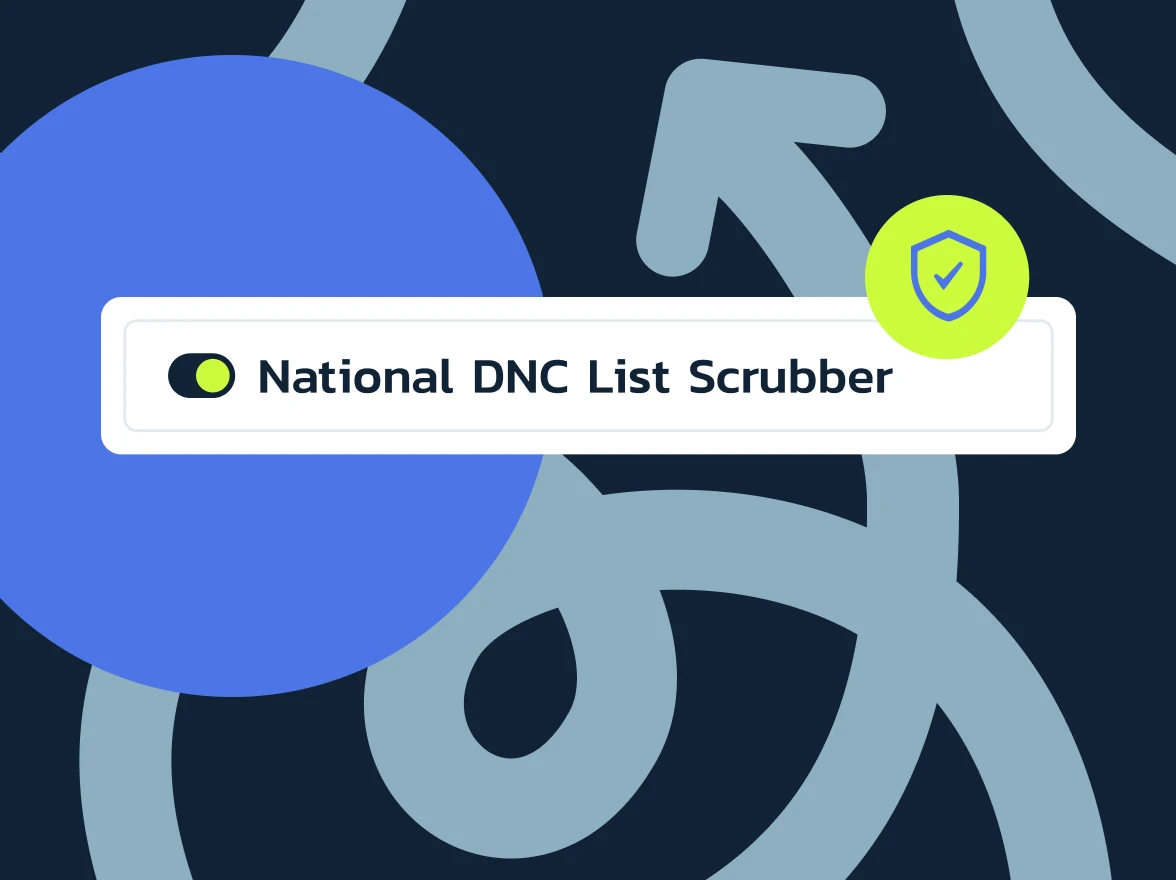When managing a call center, picking the right tool for making phone calls can make a big difference in your team’s success. Auto dialers and predictive dialers are two popular choices, but they work best in different situations. This guide will help you understand how each type of dialer works and what kind of businesses might benefit from using them.
What is an auto dialer?
An auto dialer, often referred to as the progressive dialer, is a software tool designed to automate the process of making phone calls. It systematically dials numbers from a contact list immediately after an agent finishes a call, ensuring a continuous flow of communication without manual intervention. This technology is particularly effective for tasks such as contacting leads, conducting follow-ups, or carrying out customer surveys, where maintaining constant agent engagement is crucial.
Auto dialers ensure that there is minimal downtime between calls. Once an agent completes a call and performs any necessary after-call work, the system automatically dials the next contact, keeping the ratio of calls made to available agents at a balanced one-to-one. This ensures each lead receives prompt attention, increasing call center success rates and agent productivity. Settings such as ring time, wrap-up time, and retry intervals can typically be customized to align with specific campaign objectives, making auto dialers a versatile tool for call center operations.
How it works
An auto dialer automates the process of making phone calls in a call center, ensuring a consistent workflow. Here’s how it typically operates:
- Immediate call connection: As soon as an agent finishes a call, the auto dialer immediately dials the next contact. This minimizes the wait time for agents and keeps them engaged.
- Wrap-up time: After a call ends, agents have designated time to complete any after-call tasks such as updating records or scheduling follow-ups.
- Continuous dialing: If the contacted person doesn’t answer or the call goes to voicemail, the system promptly dials the next number on the list.
- Balanced call ratio: The system maintains a 1:1 ratio of calls to available agents, ensuring that as soon as an agent is free, another call is placed.
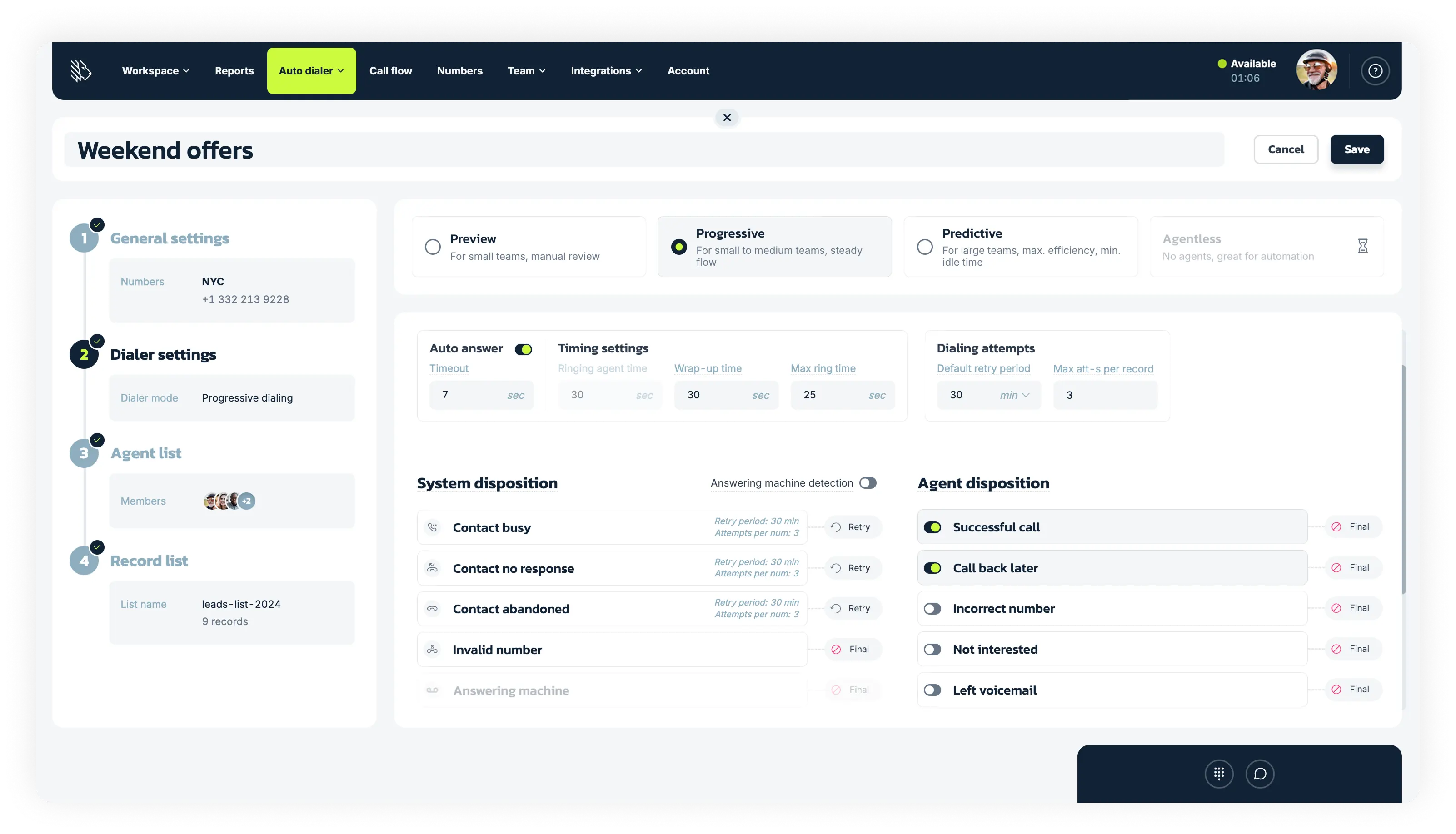
Pros & Cons
Here’s a detailed comparison of the advantages and disadvantages of using an auto dialer in a call center environment:
| Advantages | Disadvantages |
|---|---|
| Increased productivity: Automates the calling process, allowing agents to handle more calls in less time | Potential for customer annoyance: High call volumes can lead to negative reactions if calls are perceived as too frequent or intrusive |
| Reduced idle time: Minimizes the downtime agents experience between calls, keeping them engaged | Less personalization: Rapid call pacing can limit the time agents have to prepare for each call, potentially reducing the quality of interactions |
| Consistent call flow: Maintains a steady pace of calls, ensuring that agents consistently have work | Compliance risks: Must be carefully managed to comply with telecommunications laws and regulations, which vary by region |
| Smart resource allocation: Optimizes the use of available agents by ensuring that they are almost always on a call | Training requirements: Requires comprehensive training for agents to handle the pace and use of the technology effectively |
| Data collection and analysis: Provides valuable data on call outcomes and agent performance, aiding in strategic planning |
These points provide a balanced view of how auto dialers can both enhance and challenge call center operations, helping businesses to weigh their options based on their specific needs.
Who should use it?
Auto dialers are best suited for organizations that require high intensity and handle a steady flow of calls. These tools are designed to optimize the time agents spend on the phone, reducing idle time and maximizing contact rates. They are particularly effective for tasks that involve straightforward queries or information dissemination.
Tasks suited for an auto dialer include:
- Routine customer inquiries
- Payment reminders
- Appointment confirmations
- Simple surveys
- Quick follow-ups that do not require extensive pre-call preparation
Industries that can benefit from an auto dialer:
- Telemarketing: Ideal for businesses that need to reach a large volume of customers with sales pitches or product updates. Auto dialers can dramatically increase call numbers, helping telemarketing campaigns achieve their targets faster.
- Collections agencies: These agencies benefit from auto dialers as they need to make multiple attempts to contact clients about outstanding payments, making the process more consistent.
- Utility companies: Useful for sending out billing reminders, service change notifications, or emergency alerts. Auto dialers ensure that all customers receive timely updates, improving customer service and operations.
- Healthcare: Essential for managing large-scale appointment scheduling and patient reminders, reducing no-shows and ensuring patients are informed about their upcoming appointments or necessary health actions.
- Market research: Facilitates the gathering of data through surveys conducted over the phone. Auto dialers enable market research firms to reach a broad audience quickly and gather valuable insights.
MightyCall’s auto dialer
For businesses aiming to improve their call center operations with personalized customer interactions, MightyCall offers a sophisticated preview dialer. This tool is designed for small to medium-sized businesses (SMBs) but includes features often found in enterprise-level systems. Key aspects of MightyCall’s preview dialer include:
- Enterprise-level technology adapted for SMBs: Provides advanced call center functionalities suitable for smaller operations.
- User-friendly interface: The intuitive design makes it easy for agents to navigate and use the system.
- Flexible settings: Allows customization to meet the specific needs of different campaigns.
- High-availability seamless redundancy infrastructure: Instantly switches to backup systems for zero service disruption.
- National DNC integration: Helps ensure compliance with the national Do Not Call registry.
- Answering machine detection (AMD): Skips voicemails so agents connect only with real people.
- Auto answer: Automatically picks up calls after a set number of seconds to keep workflows smooth.
By incorporating MightyCall’s preview dialer, companies can make their agents more productive, expand customer reach, and achieve their operational goals.
What is a predictive dialer?
A predictive dialer is an advanced call dialing mode used in call centers to improve outbound campaigns. It automates the dialing process by calling multiple numbers simultaneously and only connecting an agent when a call is answered. This technology minimizes agent downtime by reducing the wait time between conversations and significantly increases the number of calls each agent can handle.
Predictive dialers are particularly useful in call centers where the volume of outbound calls is high. By predicting when agents will be available and adjusting the calling rate accordingly, the system ensures that agents spend more time engaging with potential customers, thus maximizing productivity and outreach. This makes predictive dialers an ideal choice for operations such as telemarketing, debt collection, and customer outreach programs.
How it works
The predictive dialer is a call processing system that improves the productivity of call centers by using algorithms to manage call flows dynamically. Here’s a concise breakdown of how it operates:
- Multiple calls: The dialer starts by calling multiple contacts at once, ensuring a high volume of ongoing calls.
- Connection to agents: When a contact answers, the system immediately connects them to the next available agent, reducing wait time for both the caller and the agent.
- Use algorithms: For example, MightyCall’s predictive dialer uses algorithms to predict when an agent will become available and analyze campaign metrics such as engagement levels and the number of abandoned calls.
- Recommended abandonment rate: MightyCall recommends maintaining an abandonment rate of no more than 3% to comply with regulations, helping to balance operational effectiveness with legal compliance.
- Reduced waiting time: This strategic dialing ensures minimal waiting time for contacts on the line, as an agent is likely to be available shortly after the contact picks up.
- Handling non-responses: If a contact doesn’t answer or a call goes to voicemail, the system quickly moves to the next number on the list.
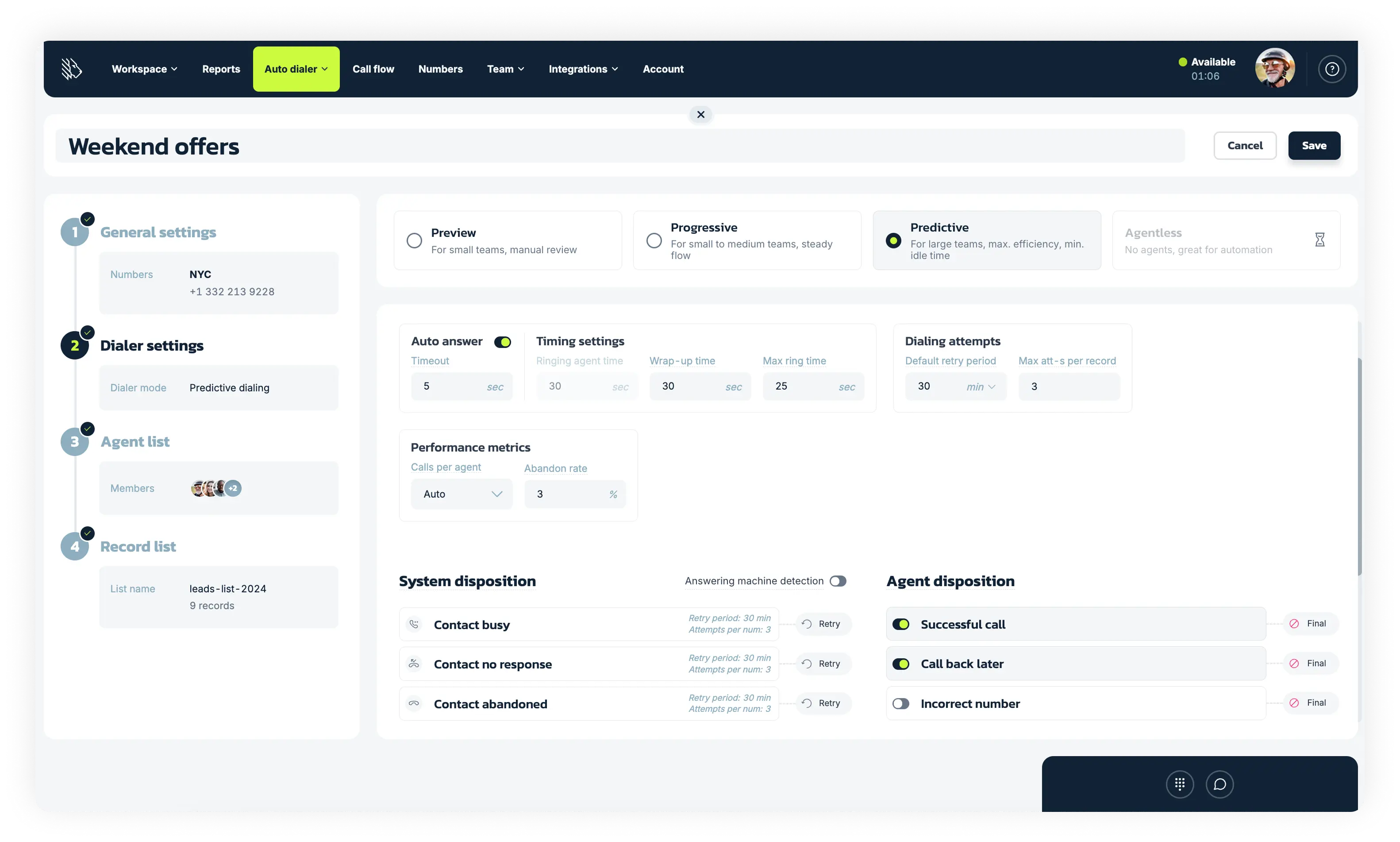
MightyCall’s predictive dialer allows for detailed customization to suit specific campaign needs, such as:
- Auto answer: Set the number of seconds after which the call will be automatically connected without the agent’s manual pickup.
- Ringing agent time: Sets how long the system tries to connect the call with an available agent.
- Wrap-up time: Allocates time after a call for agents to complete necessary tasks.
- Max ring time: Determines how long the system rings a contact before moving on.
- Default retry period: Specifies when to redial a contact if the initial attempt is unsuccessful.
- Max attempts per number: Limits the number of times a contact is called.
- Calls per agent: Determine the number of outbound calls that go out simultaneously per available agent.
- Abandon rate: Sets a threshold for the percentage of calls that are abandoned before connection to help ensure compliance with regulations.
There are more features, such as the native DNC Registry integration and dispositions. MightyCall’s predictive dialer system is designed not only to maximize call center productivity but also to ensure operations remain within regulatory guidelines, making it an invaluable tool for modern call center operations.
Pros & Cons
Here’s a detailed comparison of the advantages and disadvantages of using a predictive dialer in a call center environment:
| Advantages | Disadvantages |
|---|---|
| Increased call productivity: Maximizes the number of calls made, connecting agents only when a contact answers | Potential for customer annoyance: High call volume can lead to negative reactions if calls are perceived as intrusive |
| Reduced agent downtime: Minimizes idle time between calls, keeping agents continuously engaged | Dependency on technology: Relies heavily on algorithms, which can falter if not properly calibrated or maintained |
| Optimized resource use: Ensures that each agent is working at their full potential, increasing overall productivity | Risk of regulatory issues: Requires careful management to adhere to telecommunications regulations |
| Scalable operations: Can handle large volumes of calls, making it ideal for expanding call center activities | Initial setup complexity: Involves intricate setup and configuration to align with specific campaign goals |
| Data-driven decision making: Provides insights from call analytics to improve strategies and agent performance | Limited personal touch: May not be suitable for calls requiring detailed prior knowledge or a personalized approach |
These points provide a balanced view of how predictive dialers can both enhance and challenge call center operations, helping businesses to weigh their options based on their specific needs and capabilities.
Who should use it?
Predictive dialers are best suited for businesses that require professional handling of a high volume of outbound calls and seek to optimize agent productivity. This type of dialer is designed for operations where the emphasis is on reaching as many contacts as possible within the shortest amount of time.
Tasks suited for a predictive dialer include:
- High-volume sales calls
- Marketing campaigns
- Debt collection
- Event reminders
- Customer satisfaction surveys
Industries that can benefit from a predictive dialer:
- Telemarketing: Companies in this sector can significantly increase their call rates, making it possible to contact a large number of potential customers each day.
- Debt collection agencies: Frequent contact attempts are crucial, and predictive dialers automate and optimize this process.
- Financial services: For promoting new offers or services and managing client portfolios on a large scale.
- Market research firms: Able to conduct surveys across a broad demographic.
- Healthcare: For appointment reminders and reaching out to patients for health campaigns.
MightyCall’s predictive dialer
For businesses aiming to refine their outbound call strategies, integrating MightyCall’s predictive dialer could be a strategic move. Designed for SMBs but built with enterprise-level features, this dialer significantly improves call operations. Here are the key features:
- Enterprise-level technology for SMBs: Adapts high-end dialer functions to the needs and scales of small to medium-sized businesses.
- Intuitive interface: Easy to use, allowing quick adaptation and minimal training.
- Flexible settings: Customize to fit the specific demands of your operations.
- High-availability seamless redundancy infrastructure: Ensures continuous operation across multiple synchronized servers.
- National DNC integration: Ensures compliance with telemarketing regulations.
- Advanced algorithms: Reduces wait times and abandoned rates, improving call operations.
- 10-line predictive dialing: Supervisors set 1–10 calls per agent to match campaign speed with list quality.
- Answering machine detection (AMD): Skips voicemails so agents talk only to real people.
- Auto answer: Answers calls after a set time to keep workflows uninterrupted.
Auto dialer vs. Predictive dialer: Key differences
Choosing the right dialing technology is crucial for your call center operations. Predictive dialers and auto dialers, though similar in their purpose to streamline outbound calls, differ significantly in their mechanisms and ideal use cases. This section outlines the fundamental differences between these two types of dialers to help you decide which suits your business needs better.
Below is a comparative table highlighting the key differences between predictive and auto dialers:
| Feature | Progressive dialer | Preview Dialer |
|---|---|---|
| Dialing method | Dials one number at a time as soon as the agent becomes available | Dials multiple numbers simultaneously and connects a call only when answered |
| Call management | Continuously dials without predicting agent availability, may lead to brief agent wait times | Uses algorithms to predict agent availability and adjusts dialing rate accordingly |
| Target use | Suitable for smaller or mid-sized operations that need steady call flow without complex algorithms | Best for large call centers with high call volumes where maximizing talk time is critical |
| Operational impact | Reduces idle time but not as effectively as predictive systems | Maximizes agent talk time by significantly reducing idle time |
| Compliance and risk | Lower risk of compliance issues, simpler to manage in terms of regulations | Higher risk of regulatory issues due to aggressive dialing patterns; requires careful compliance management |
Dialing method
Predictive Dialers employ advanced algorithms to dial multiple numbers at once, only connecting agents to calls that are answered. This method dramatically reduces the wait time between calls, enhancing productivity.
Auto Dialers, or progressive dialers, dial one contact after another, immediately assigning calls to available agents. This ensures a constant flow but can occasionally result in brief agent downtime if the timing isn’t perfectly aligned.
Call management
Predictive Dialers adjust their calling rate based on real-time analysis of agent availability and call metrics, such as average call duration and success rate, which helps in maintaining an effective operation without overburdening agents.
Auto Dialers operate on a simpler mechanism that does not involve real-time adjustments based on agent status, making them easier to set up but potentially less effective.
Target use
Predictive Dialers are ideal for large-scale operations that can benefit from sophisticated call handling strategies to manage large volumes of calls, such as in telemarketing and debt collection industries.
Auto Dialers are better suited for smaller scale operations where the call volume is manageable but still requires a steady workflow, such as in customer service or local campaign outreach.
Operational impact
Predictive Dialers maximize operational effectiveness by ensuring agents spend more time talking to potential clients and less time waiting for calls to connect.
Auto Dialers improve effectiveness over manual dialing but don’t offer the same level of optimization as predictive models due to the lack of real-time adjustment capabilities.
Compliance and risk
Predictive Dialers might dial too aggressively, leading to potential regulatory compliance issues, especially under strict telemarketing laws that limit contact rates.
Auto Dialers typically pose fewer compliance risks, making them a safer choice for businesses concerned about adhering to telecommunications regulations.
Understanding these distinctions will help you choose the most appropriate dialer technology for your business, ensuring that your call center operates optimally and aligns with your strategic goals.
Use cases
Understanding the practical applications of auto dialers and predictive dialers can help you determine which technology aligns best with your operational needs. Below are examples of how each type of dialer can be used effectively across different industries, using detailed scenarios of fictional companies.
Auto dialer
Example: Home services
Company: Parrot Solutions
Scenario: Parrot Solutions, a provider of home repair and maintenance services, uses an auto dialer to manage appointment confirmations and service reminders for hundreds of clients daily.
Use case:
- Appointment confirmations: Automatically calls clients to confirm upcoming appointments, ensuring effective scheduling and reducing no-shows.
- Service reminders: Sends out reminders for upcoming maintenance services, helping clients maintain their home systems in optimal condition.
This scenario illustrates how Parrot Solutions uses an auto dialer to maintain high customer engagement and organize operations, ensuring clients receive timely reminders.
Predictive dialer
Example: Dynamic sales outreach
Company: BlueConnect Call Center
Scenario: BlueConnect Center, a company specializing in high-volume telemarketing for various products and services, uses a predictive dialer to enhance agent productivity and reach more potential customers.
Use case:
- Lead generation: The predictive dialer effectively manages a large database of leads, automatically connecting agents to calls only when a person answers.
- Market expansion: Allows the call center to quickly adjust strategies based on real-time data, optimizing campaigns to tap into new customer segments.
In this example, BlueConnect use of a predictive dialer dramatically increases their contact rates, helping them to maximize sales opportunities and expand their market reach.
Auto dialer or predictive dialer: How to choose?
Choosing between an auto dialer and a predictive dialer involves considering several key factors:
- Call volume: High call volumes with a need for thorough management favor predictive dialers, while lower volumes managed at a steady pace are well-suited for auto dialers.
- Operational scale: Large operations that can benefit from sophisticated algorithms might prefer predictive dialers, whereas smaller teams may find auto dialers adequately meet their needs.
- Compliance requirements: Predictive dialers require careful management to avoid regulatory penalties, making auto dialers a potentially safer choice for businesses concerned with compliance.
- Customer engagement needs: If detailed customer interaction is vital, an auto dialer that allows for pre-call preparation might be more beneficial.
Which is best for your business?
Choosing the right dialer technology—auto or predictive—can significantly impact your call center’s effectiveness. If your operations require handling high volumes of calls with advanced management, a predictive dialer might be the ideal choice due to its sophisticated call management features. Conversely, if your business values steady call flow with an emphasis on customer engagement for each call, an auto dialer would be more suitable.
MightyCall offers both auto and predictive dialers, providing versatile solutions to meet diverse business needs. Whether you aim to improve operational effectiveness or improve the quality of customer interactions, you are invited to try the services and discover how MightyCall’s technology can help you achieve your business objectives.



